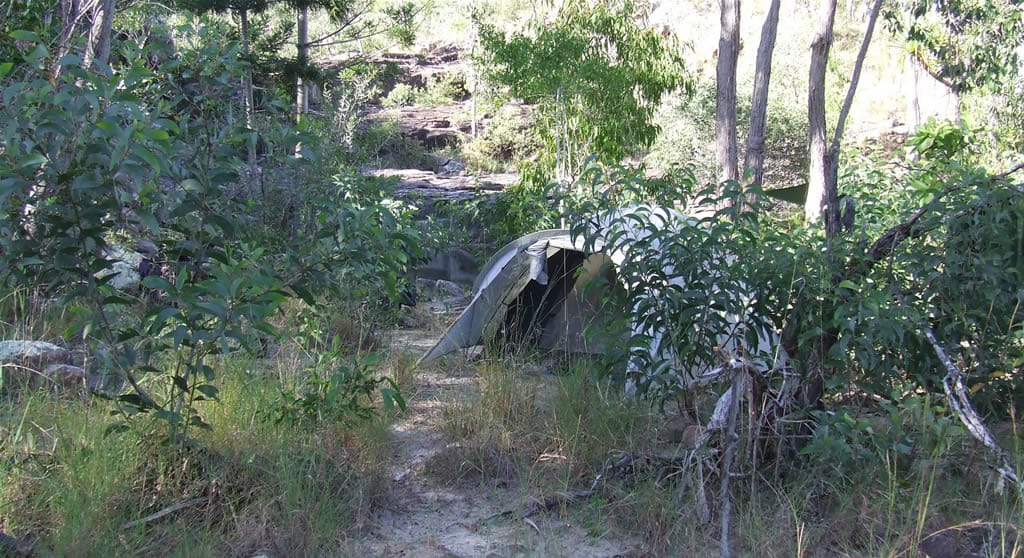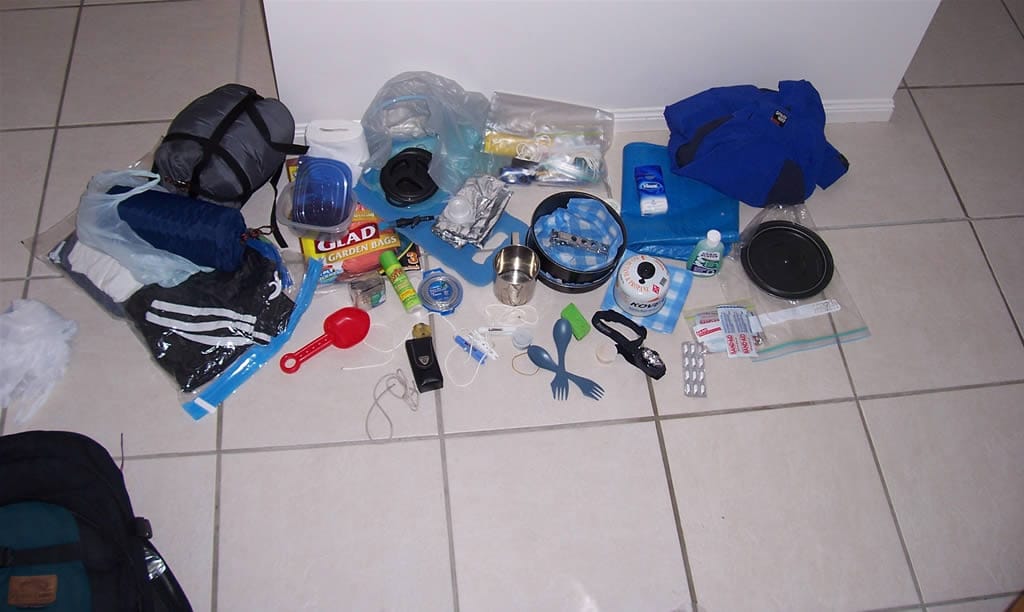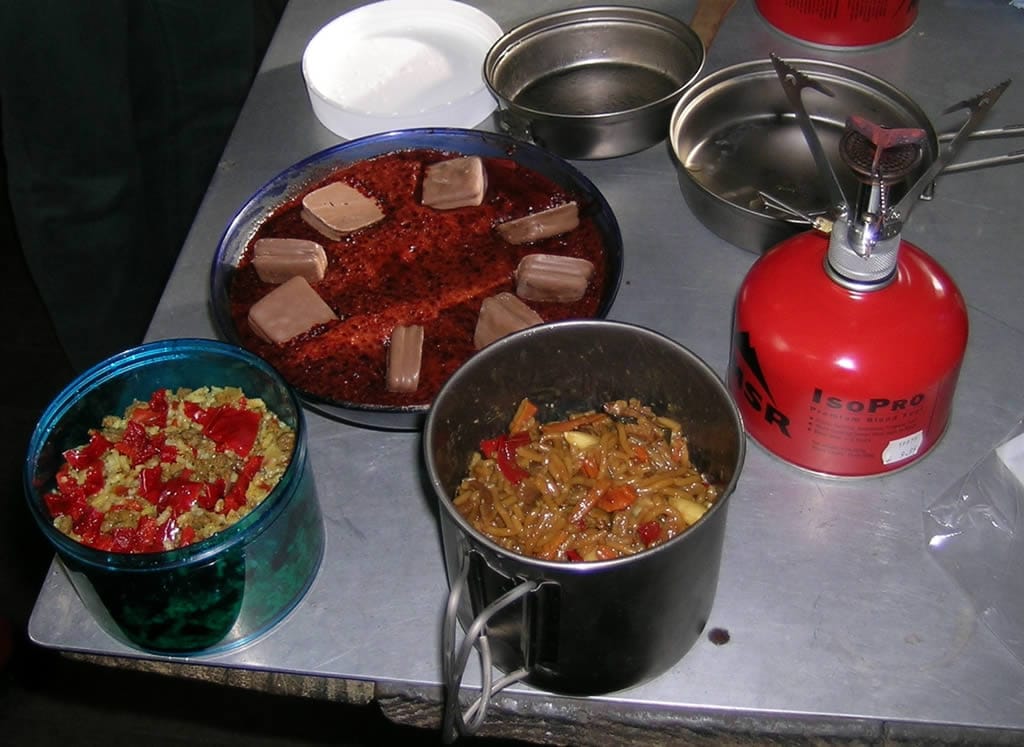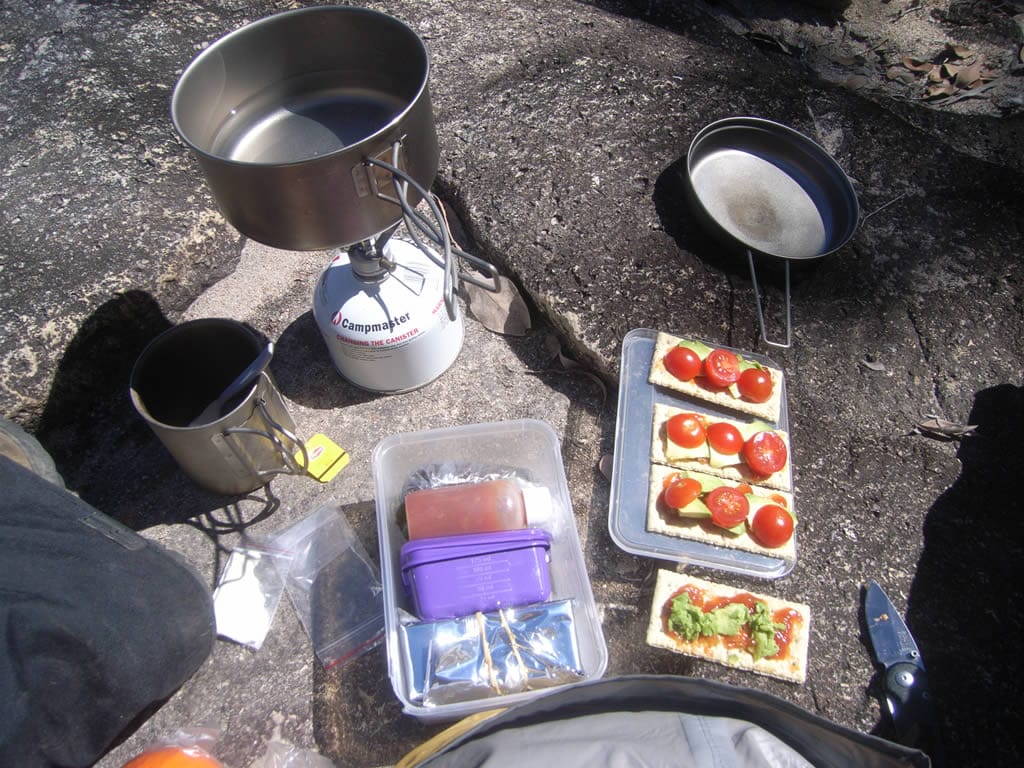What to Bring?

We bushwalk mainly on cross-country terrain, not on tracks. The bush is prickly and scratchy on arms, legs and faces. The grasses in far north Queensland are long and have penetrating seeds, and rocks can be hard on the hands. Ticks, leeches and snakes are present in areas where we walk. Stinging trees are present in some regions. You will sweat a lot on many of the walks, and your clothing needs to be able to "breathe" and wick the moisture away. Many modern synthetics available in bushwalking shops do this well, being lightweight and drying quickly.



Essentials for any walk
First Aid Kit
- Water/Windproof Matches - or lighter stored in a zip lock bag - wet ones don't work.
- Torch, space blanket and whistle - (in the unforeseen event you need to bivvy out overnight)
- Lightweight warm jersey +/- raincoat - depending on time of year and weather.
- Map and Compass - (& knowledge in their use)
- Water - amount varies according to where you are walking, hydration bladders are a convenient way to carry & dispense.
- Spare Food - i.e. extra muesli/energy bar, instant soup, biscuits, dried fruit.
- Change of Clothing to leave in the vehicle for the return journey.
- Cash to pay the club walk fee, a share of travel costs ($10.00 or more depending on distance, car engine size, and number of people in the car) and for ice cream and/or drinks at the end of the walk.
Food:
- Breakfast - Muesli, quick cooking oats or freeze-dried. Uncle Toby's Oat Temptations are yummy, but you will need two sachets, not one.
- Lunch - dry biscuits with cheese, salami, tuna, peanut paste or jam; packet soup, or 2-minute noodles.
- Supper - Dehydrated or freeze-dried food- "Back Country" or "Backpackers Pantry" are two widely available freeze-dried foods. Couscous, polenta, or freeze-dried rice cooked with a stock cube and freeze-dried vegetables is another alternative. Or you can dehydrate your own food.
- Beverages - can purchase coffee or hot chocolate in satchels to which you add boiling water. The purist can bring the separate ingredients needed to make a "cuppa".
- Snacks - chocolate, nuts, dried fruit, muesli bars.
- Alcohol - optional, to be enjoyed at camp.
It is important to measure out the exact requirements and bring 1 day's extra rations in case of delay. While the freeze-dried dinners provide the required amount of food, you will need to estimate how much food you will eat at lunch and breakfast, as well as the amount of snacks you will consume, and bring only that amount. Portion it out. Remember, every gram counts!
Utensils:
- Gas stove - lightweight. The MSR "pocket rocket" is very popular. For longer walks, white spirit stoves such as the MSR "whisperlite" are efficient.
- Billy - lightweight aluminium or titanium. How big? Big enough to boil water for freeze-dried food and a cuppa.
- Cup, bowl and spork or fork and spoon - A Billy lid can sometimes double as a bowl.
- Sunscreen and insect repellent - depending on time of year and walk location.
- Torch - for use at night. Headlights work best. Bring spare batteries.
- Pocket knife - Lightweight and sharp.
- Camera - optional.
- Sleeping bag - This again is a personal choice as to whether you have a full zip or ½ zip, down or synthetic. Shop around; ask other members what they have and why they like that choice, before purchasing. The lightest, lightweight sleeping bag rated at 2 degrees is a mere 400g.
- Inner sheet - Keeps the sleeping bag clean. Silk is lightweight, keeps you warm and feels good.
- Sleeping mat - Insulation isn't essential in the tropics (unlike in the southern climates) and the "Exped airmat provides the comfort of an air mattress and weighs approx 660g. If using an "Exped", make sure you bring a repair kit in case of a puncture. Otherwise, a "Thermorest" "Prolite" is lighter (but not as comfortable) and will provide the insulation needed in colder climates.
- Tent - A 2-man tent shouldn't weigh any more than 2.2 kgs. An expensive tent isn't essential, as we don't experience the same climatic extremes as those found in colder climates. A generous vestibule to store gear makes camping more comfortable. Have a look around, examine catalogues, camping shops, and the internet before making a final purchase. Remember that using a "footprint" for the tent will help prevent damage to the floor.
Day Walks
The Essentials - and including the following:
Day Pack
- Clothing - Hat, long-sleeved lightweight shirt, shorts or trousers, comfortable socks and good walking boots/shoes with a stiff sole and plenty of tread. Gaiters are strongly recommended, as many walks are cross-country. They protect the lower legs from scratches and stings, as well as from sticks, grasses, and stones getting inside the boots. Long-sleeve shirts and trousers will provide some protection from Mother Nature, such as the sun, scratchy bushes, and stinging trees. Light colours absorb less heat than dark colours.
- Lunch - can consist of sandwiches and fruit, crackers and tuna, instant soups/noodles. Bring a stove and mug for tea/coffee, if you want to boil water for a "cuppa" - some carry a small thermos.
- Snacks - nuts, dried fruit, energy bar, fresh fruit, biscuits, etc. Enough for am and pm.
- Stove - Lightweight gas, e.g. MSR "Pocket Rocket", Jet Boil, and billy if boiling water.
- Swimming costume
- Towel - (lightweight/not bulky) optional. Some consider a class A towel a luxury item and use a large "Chux" instead.
- Camera - optional, highly recommended. A compact tough camera is suitable.
- Sunscreen and Insect Repellent - highly recommended for all bushwalks.
Overnight Walks
The Essentials - and including the following:
- Backpack - size and type are subjective and depend on what gear you carry. From 45 to 85 litres may be suitable depending on the walk and the individual. Lightweight is good!
- Pack liner - To keep the pack contents dry in case of rain or inadvertently falling in a stream. Can use a large plastic bag or purchase a lightweight commercial pack liner.
- Clothing - Will need clothes for walking during the day and clean/dry clothes to wear at night. It is a personal choice as to how many, but remember that they need to be carried, and every gram counts!
Suggested is the following:
- Same to wear whilst walking as recommended for "day walks" as above.
- The modern synthetics that are available in camping shops are best as they are breathable, wick away moisture, dry quickly and are lightweight. Socks should be well-fitting and comfortable. Modern synthetic socks wick away moisture, are lightweight and dry quickly.
- At night, a clean shirt and longs are needed to change into. Warm clothes are also often required - it can get cold in the tropics on the ranges behind Townsville. Recommended are the following: a "Polartec" jersey, a beanie and a polypropylene long-sleeved vest +/- long johns. A lightweight, waterproof jacket can serve as both a wind barrier and a raincoat. "Gore-Tex" or equivalent is recommended as it is also breathable and reduces sweating.
- Remember to bring a change of underwear, socks, and shoes or thongs to wear around camp. "Crocs" or equivalent are lightweight, and socks can be worn under these on cold nights.
- Swimming costume - we usually camp near a pool.
- Towel - Lightweight, synthetic ones dry quickly and are available at camping shops. Some consider this item a luxury and use a large chux.
- Toiletries - decant into tiny containers and only bring what will be used. Remember to take regular medications. Soaps are harmful to our fragile environment and shouldn't be used in streams.
- Remember the toilet paper and lightweight spade!

Maps – Free online digital topographic maps are available at QTOPO, now covering most areas at a 1:10,000 scale. If you use the Avenza app on your smart mobile device, you can download the QTOPO maps in Avenza for live topographic mapping on your device. Alternatively, you can print the maps from QTOPO if you prefer a paper map (batteries don’t run out on paper maps). The club recommends always carrying a paper map as a backup, in case you need to use smart devices for bushwalking navigation/mapping.
